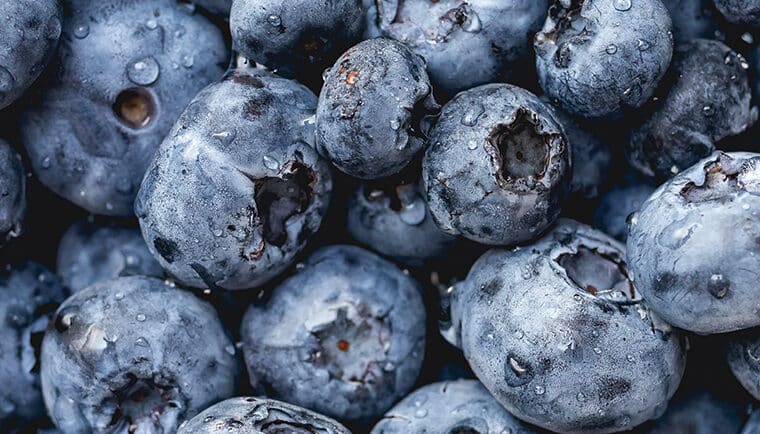
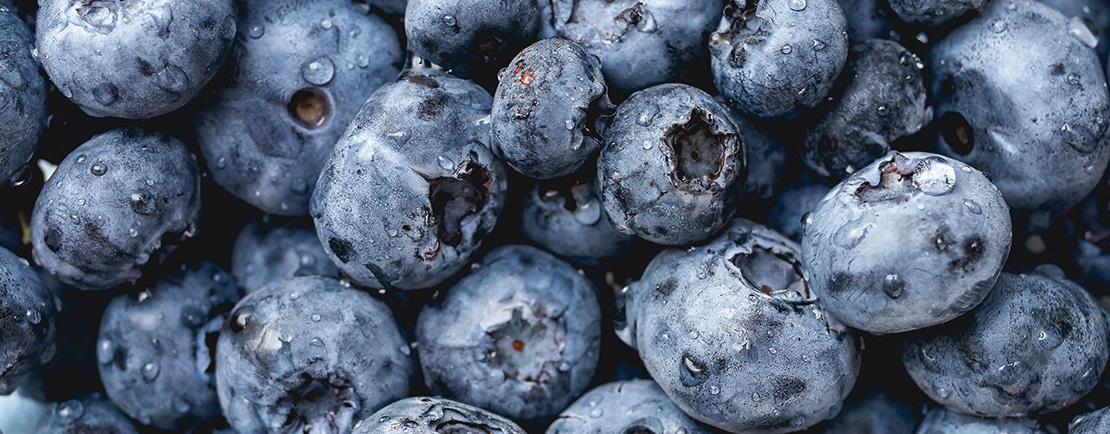


Written by Jaime Bachtell-Shelbert, an Illinois-based holistic, plant based dietitian with a love for all things gut health.
The more opportunities you have to incorporate plants into your diet, the better. As a registered dietitian, I encourage clients to eat an abundance and variety of plants and nutrient-rich, whole foods. Fruits, vegetables, legumes, grains, nuts and seeds are the core of a whole-food plant-based diet. Eating a whole food, plant-based diet can include packaged foods – as long as these packaged foods are made from real ingredients.
Forager Project uses only simple, organic ingredients to make plant-based foods. Every product Forager Project makes is certified organic, meaning you will never find any pesticides, chemicals, or GMOs in their products.
Let’s explore key ingredients in a whole foods, plant-based diet and in Forager Project products, focusing on each ingredient’s overall nutritional and health benefits.
Cashews
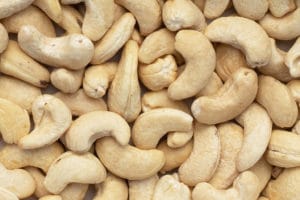
Nuts, such as cashews, are a healthy part of a plant-based diet. Not only are nuts recommended as part of the Mediterranean Diet (repeatedly ranked as the healthiest diet by U.S. News)1 but also are indicated for consumption 4-6 times per week according to the 2020-2025 Dietary Guidelines2.
Forager Project chose cashews as their core ingredient for lots of reasons. First of all, they are smooth, creamy and absolutely delicious. Cashews are also super nutritious. Cashews contain vegetable protein and fat (mostly unsaturated) as well as fiber, vitamins, minerals and phytochemicals. They are also rich in carotenoids and polyphenols, two strong antioxidants that fight inflammation and damage caused by free radicals.
A quick look at the nutrient profile of cashews and you will find 12g fat, 1g fiber, 5g protein and 9g carbohydrate in a one-ounce serving. The fat in cashews is predominantly unsaturated and contributes to a favorable cholesterol profile. Cashews are rich in the minerals copper, magnesium, iron and zinc. Both the fiber and polyphenols contained in cashews feed healthy gut bacteria contributing to a more robust microbiome and thus a healthy gut. Overall, cashews are cardioprotective, cholesterol lowering, and help maintain blood glucose control.3
Forager Project sources cashews from hand-picked family farm partners in Vietnam, where they are raised without added irrigation water (better for the planet) and harvested by hand (better for people).
Forager Project uses cashews as the base of almost all their vegan creamery products. Have you tried Forager Project’s Cashewmilk Yogurt and Milk?
Coconut Cream
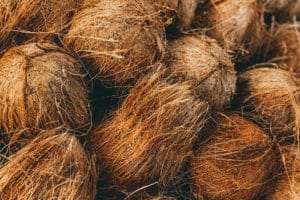
Coconut is an important crop in the tropics and is often referred to as ‘the tree of heaven’.4 If you are a coconut lover and enjoy its sweet, nutty flavor then this title makes perfect sense. Coconut cream is a dairy-free, plant-based food made from coconut and water. It is an energy dense food that is high in fat and calories, and for this reason it is best consumed in moderation. Just one ounce contains 20g of fat (18g saturated) and 190 calories. Most of the fat in coconut cream is in the form of medium chain triglycerides (MCT’s). MCT’s are metabolized efficiently in the body and are readily converted into energy rather than being stored as fat.5 For this reason MCT’s are marketed as pre-workout fuel for quick, efficient energy. In addition, MCT’s have also been linked to improved cognitive function.
Forager Project uses coconut cream to add a subtle sweet note to its Cashewmilk Yogurt and tangy Sour Cream.
Oats
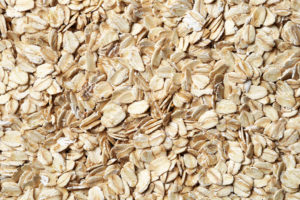
Oats fall under the whole grain category and are a healthy part of a plant-based diet. The 2020-2025 US Dietary Guidelines recommend consuming at least half of all dietary grains as whole grains.2 Regular consumption of whole grains, such as oats, reduces the risk for chronic diseases such as cardiovascular disease, cancer, diabetes, and gastrointestinal disorders.7
Oats are high in soluble fiber, the type of fiber that is soluble in water and creates a gel during digestion. Soluble fiber aids in lowering cholesterol, improving blood glucose control and in feeding beneficial gut bacteria. The latter leads to improved gut health, and thus overall health. The primary type of fiber in oats is beta-glucan, which slows digestion and increases satiety- both of which assist in achieving and/or maintaining a healthy body weight.7
Oats are a carbohydrate-rich food with about 33g per ½ cup of dry oats. Of that 33g of carbohydrates, almost 6g come from fiber. Oats contain resistant starch, which is beneficial to the health of our gut microbiome. Oats also pack an impressive 8g of plant protein per ½ cup and contain only 3g of fat. Additionally, oats are high in several vitamins and minerals including phosphorus, copper, iron, selenium, zinc, magnesium and B vitamins. Finally, oats are high in a polyphenols, specifically avenanthramides, which help to reduce inflammation and regulate blood pressure.9
Oats are gluten free and provide a healthy whole grain source for those who have celiac disease or suffer from gluten intolerance.
You can find oats as the main ingredient in Forager Project’s plant-based Organic Oatmilk. Another great way to add whole grains to your breakfast is overnight oats – try this recipe for Carrot Cake Overnight Oats.
Navy Bean
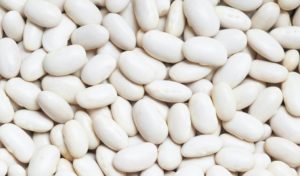
Beans, also referred to as legumes, are extremely nutrient dense and therefore are an integral part of a plant-based diet. They pack a major nutrient punch with their high fiber content (5g per ½ cup), and they provide an excellent source of plant protein (7.5g per ½ cup) for vegan or vegetarian diets. The 2020-2025 Dietary Guidelines recommend the equivalent of 1-3 cups of beans per week as part of a healthy plant based diet (recommendations dependent on calorie level of 1600-3200 calories/day).2 Navy beans are a good source of the micronutrients potassium, magnesium, folate, iron, and zinc. Additionally, they contain polyphenols, which are powerful antioxidants fighting damaging free radicals throughout the body.
Navy beans are not only a great source of dietary fiber, but they also contain resistant starch, which again provides numerous gut health benefits previously discussed. Health benefits of navy beans range from offering cardioprotective benefits, the ability to lower LDL cholesterol and protecting against metabolic syndrome which is marked by insulin resistance, obesity, dyslipidemia and hypertension.9 Navy beans also have a low glycemic index, which helps maintain glucose control and contributes to a decreased risk for developing type 2 diabetes.9
Dates
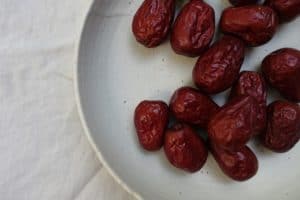
Dates are a carbohydrate-rich fruit with a high natural sugar content, primarily in the form of glucose and fructose. Due to the high nutritive value of dates, they are classified as both a functional food and a nutraceutical. What does this mean? It means that a food, in this case dates, have additional health benefits beyond basic nutrition. Let’s take a closer look at the variety of nutrients found in dates.
Dates contain an array of functional compounds including phenols, flavonols, carotenoids, and 15+ minerals including calcium, potassium, iron and magnesium and vitamin C, B vitamins and vitamin A. A cup of dates contain 6-8g of fiber, mostly insoluble and a variety of amino acids. The phytochemicals in dates (phenols, flavonols and carotenoids) are highly antioxidant and antimutagenic.10 This means that they scavenge for free radicals that damage our cells, causing disease and aging and they protect our genetic material. Additionally, dates are anti-carcinogenic, anti-inflammatory, cardioprotective and protective against gastrointestinal disorders, specifically diverticular disease, by improving digestion and transit time.
Dates are an excellent fuel source for athletes due to their natural sugar content, energy density and bioactive ingredients.11 Their high potassium content also makes them a good choice for exercise recovery.
Experience the health benefits of dates in Forager Project’s Nuts & Vanilla Protein Shake or make some tasty Vegan Blackberry Bliss Balls.
.
Cocoa
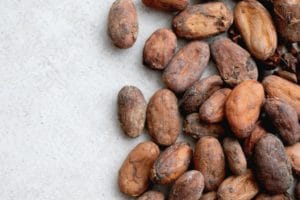
When you consider the ingredient cocoa it is likely that chocolate comes to mind. On that basis you may think that cocoa probably is not the best food choice, but this is far from true! Cocoa is a nutrient dense food that is high in fiber (2g per tablespoon), protein (1g per tablespoon) and bioactive ingredients. Cocoa is also low in sugar and fat and rich in potassium, phosphorus, copper, iron, zinc, and magnesium.
The major health benefits of cocoa are tied to its polyphenol content. Polyphenols are plant nutrients with potent antioxidant properties. Evidence consistently points to the importance of polyphenols in human health and disease. Diets rich in polyphenols have been shown to protect against cardiovascular disease, diabetes, development of cancer and neurodegenerative disease.12 Flavanols, part of the polyphenol family, give cocoa its bitter taste. Cocoa has a very high concentration of flavanols and is the main source of flavonoids in the Western diet.13 Flavonols in cocoa have an abundance of health benefits throughout the body. They improve vascular function, reduce blood pressure, improve insulin sensitivity, reduce inflammation, and combat oxidative stress.
Enjoy the nutritional benefits of cocoa in Forager Project’s Nuts & Cocoa Protein Shake or try making your own Chocolate Frozen Yogurt Pops.
The average American consumes 2,000 pounds of food per year. With that in mind it is easy to see why it is important to pay attention to the food you consume. While whole, plant-based foods should come first, there is room for packaged foods as long as they contain real ingredients. The Forager Project ingredients outlined here play an important role in maintaining overall health, and thus are a perfect example of how ingredients in food matter. When purchasing packaged food, check the number and type of ingredients on the nutrition facts panel. Generally, healthy packaged foods have a shorter ingredient lists and the ingredients can be easily pronounced. Eating largely whole foods and following a couple tips and tricks when eating packaged foods, makes eating a healthy, plant-based diet possible for all.
References:
1. U.S. News Staff. “Mediterranean Diet.” U.S. News & World Report, 4 Jan. 2021, health.usnews.com/best-diet/mediterranean-diet.
2.: U.S. Department of Agriculture and U.S. Department of Health and Human Services. Dietary Guidelines for Americans, 2020-2025. 9th Edition. December 2020. Available at DietaryGuidelines.gov
3.García-Lorda, P., Megias Rangil, I. & Salas-Salvadó, J. Nut consumption, body weight and insulin resistance. Eur J Clin Nutr 57, S8–S11 (2003). https://doi.org/10.1038/sj.ejcn.1601802
4.Sangamithra A, Swamy Gabriela John, Sorna Prema R, Chandrasekar V, Sasikala S, Hasker Ef. “Coconut: An extensive review on value added products.” Indian Food Industry Mag vol 32,6 (2013): 29-36.
5. Hewlings S. Coconuts and Health: Different Chain Lengths of Saturated Fats Require Different Consideration. Journal of Cardiovascular Development and Disease. 2020; 7(4):59. https://doi.org/10.3390/jcdd7040059
6. Adugna Bayata, Review on Nutritional Value of Cassava for Use as a Staple Food, Science Journal of Analytical Chemistry. Vol. 7, No. 4, 2019, pp. 83-91. doi: 10.11648/j.sjac.20190704.12
7. Clemens, R., & Van Klinken, B. (2014). Oats, more than just a whole grain: An introduction. British Journal of Nutrition, 112(S2), S1-S3. doi:10.1017/S0007114514002712
8. Meydani M. Potential health benefits of avenanthramides of oats. Nutr Rev. 2009 Dec;67(12):731-5. doi: 10.1111/j.1753-4887.2009.00256.x. PMID: 19941618.
9. Amira A. Ayad, Leonard L. Williams, Deiaa A. Gad El-Rab, Raphael Ayivi, Heather L. Colleran, Sulaiman Aljaloud & Salam A. Ibrahim | Fatih Yildiz (Reviewing editor) (2020) A review of the chemical composition, nutritional and health benefits of dates for their potential use in energy nutrition bars for athletes, Cogent Food & Agriculture, 6:1, DOI: 10.1080/23311932.2020.1809309
10. Andújar, I et al. “Cocoa polyphenols and their potential benefits for human health.” Oxidative medicine and cellular longevity vol. 2012 (2012): 906252. doi:10.1155/2012/906252
11. Goya, Luis et al. “Effect of Cocoa and Its Flavonoids on Biomarkers of Inflammation: Studies of Cell Culture, Animals and Humans.” Nutrients vol. 8,4 212. 9 Apr. 2016, doi:10.3390/nu8040212
12. Virginia Messina, Nutritional and health benefits of dried beans, The American Journal of Clinical Nutrition, Volume 100, Issue suppl_1, July 2014, Pages 437S–442S, https://doi.org/10.3945/ajcn.113.071472
13. Jain, S. M. (2013). Health benefits of dates: Phytochemicals and their functions. In E. Yaha (Ed.), Regional Workshop on the Improvement of the Dates Value Chain in the Near East and North Africa Region Kuwait, 9-12 December 2013
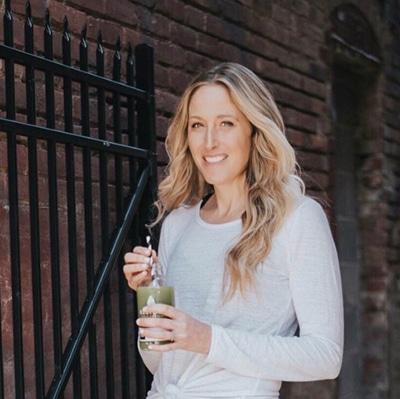
Jaime is an Illinois-based holistic, plant based dietitian with a love for all things gut health. Find Jaime on social @whollynourishedrd on Instagram, and find information about her private practice, Wholly Nourished, on her website www.whollynourished.com.